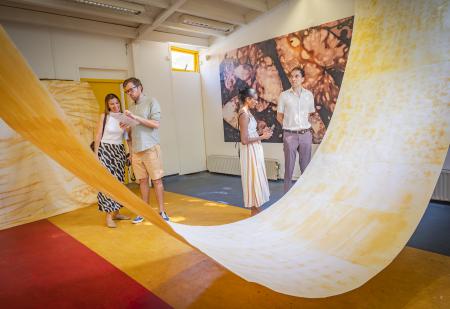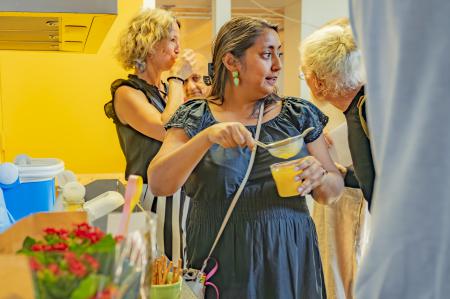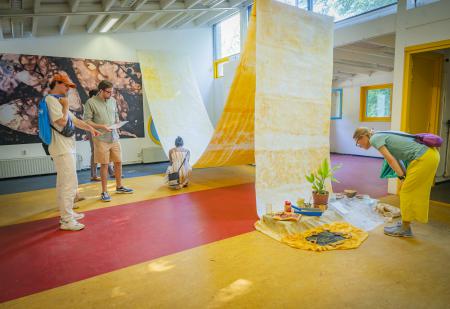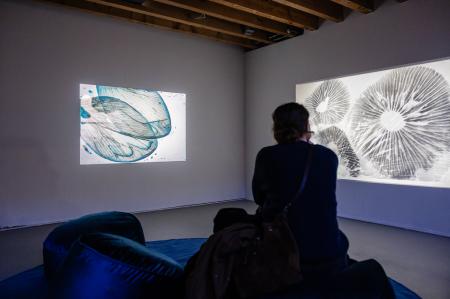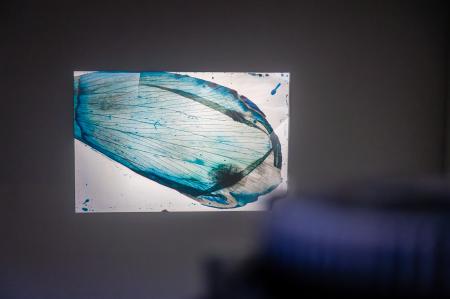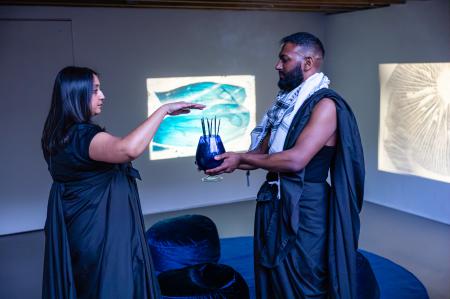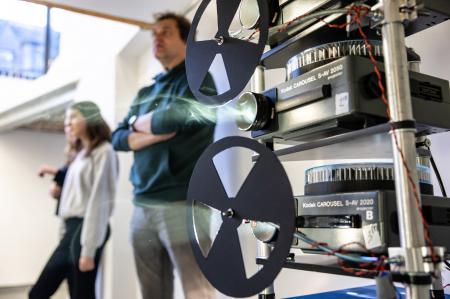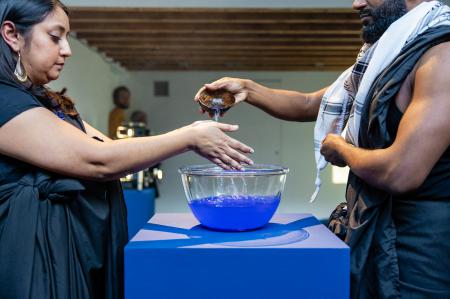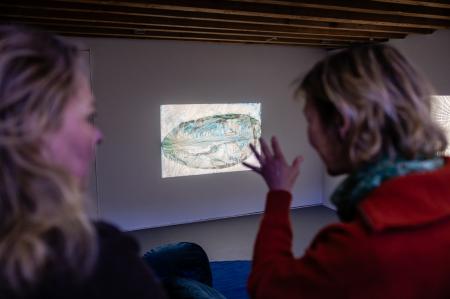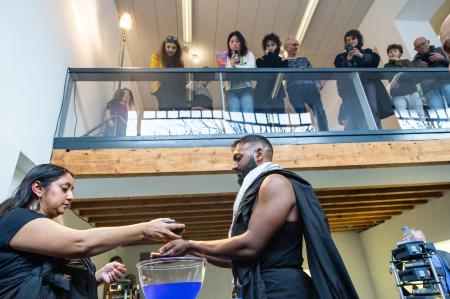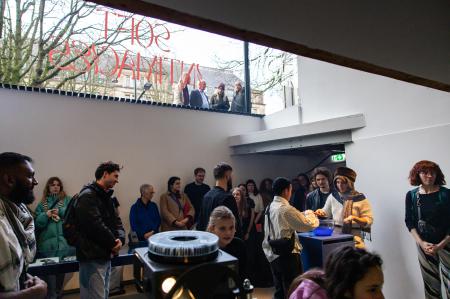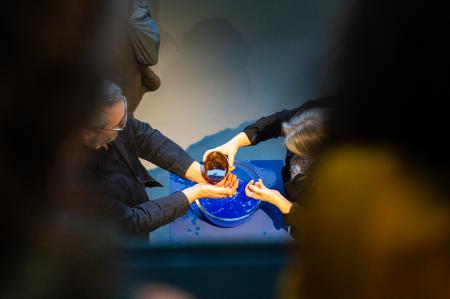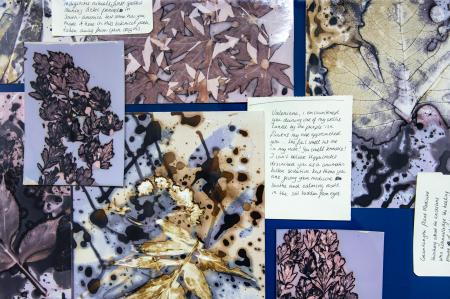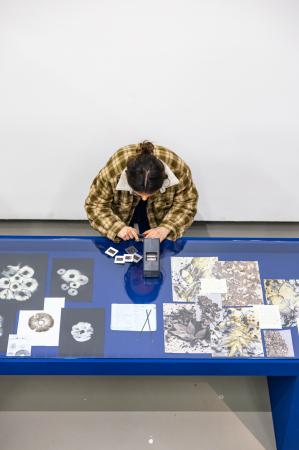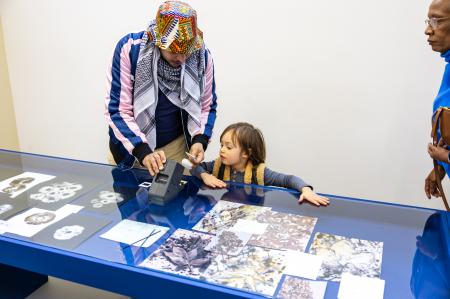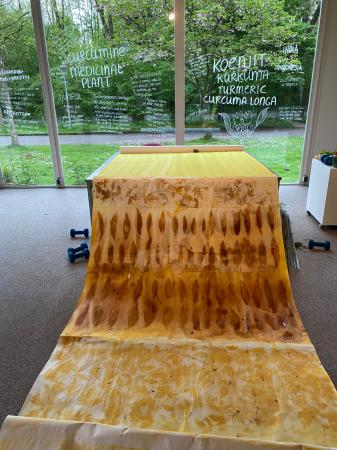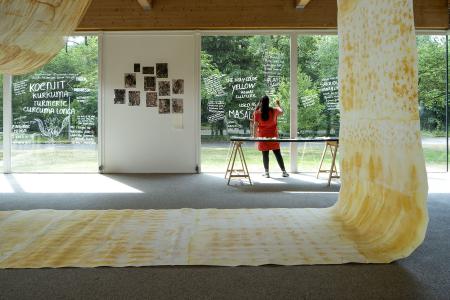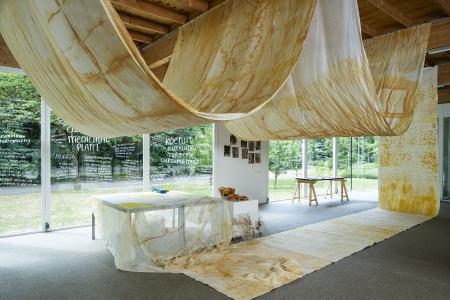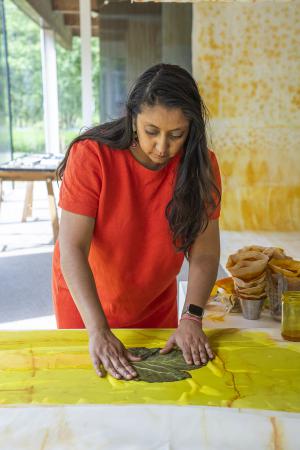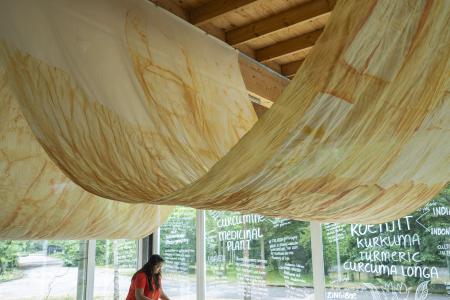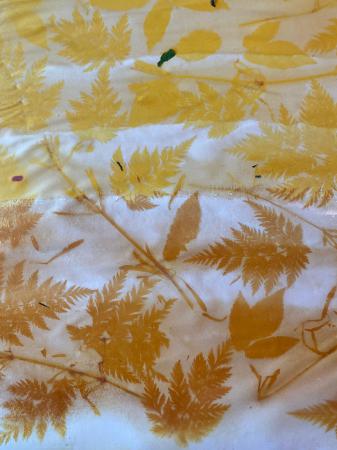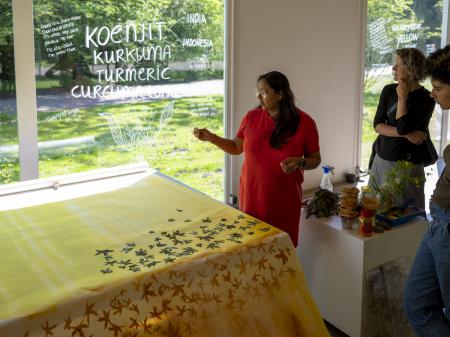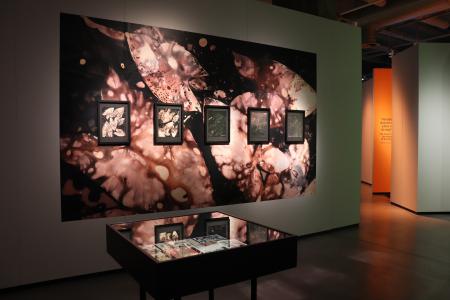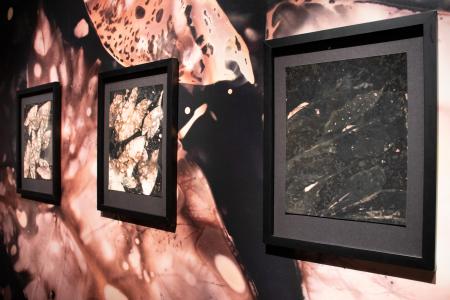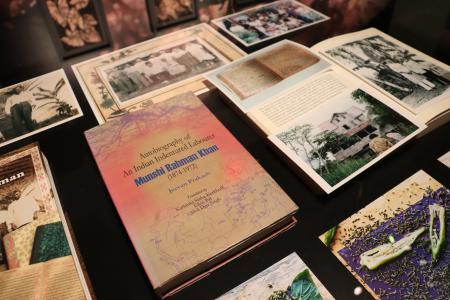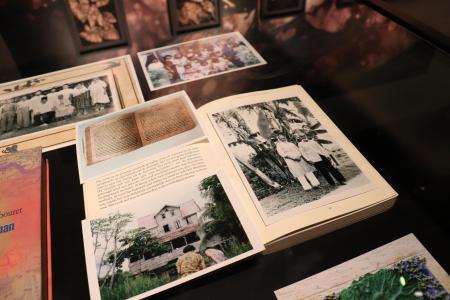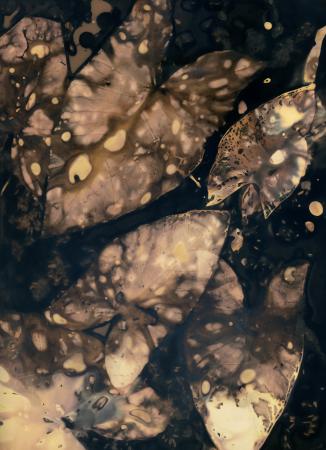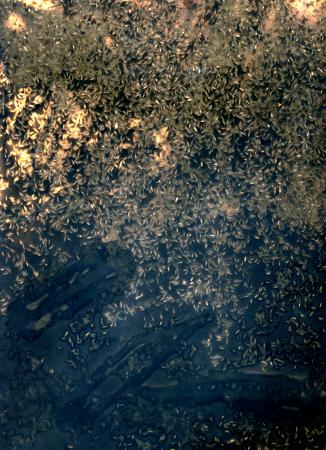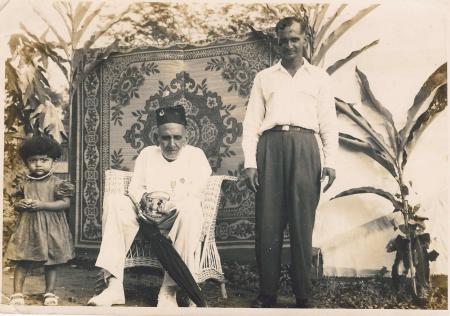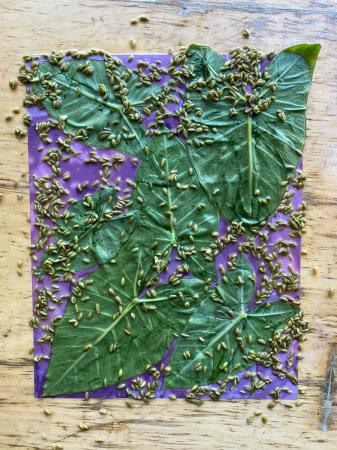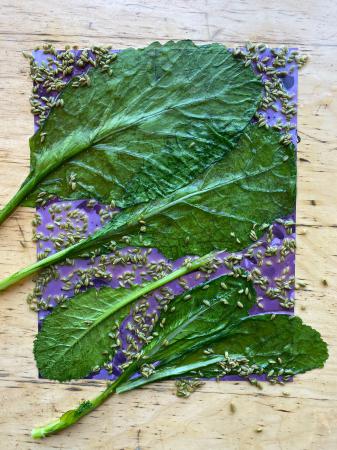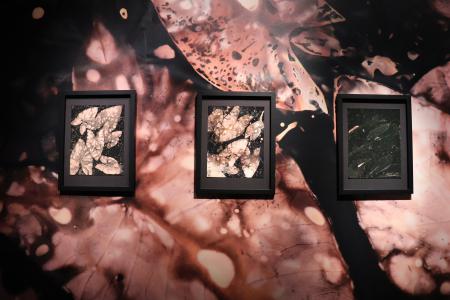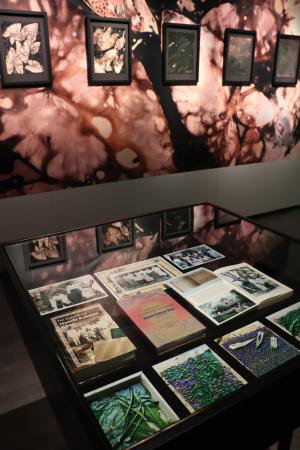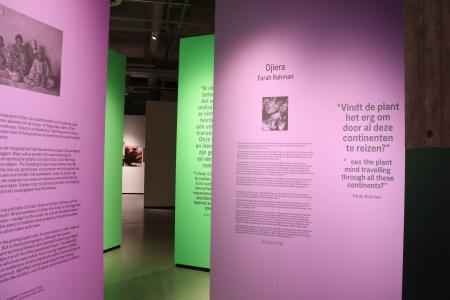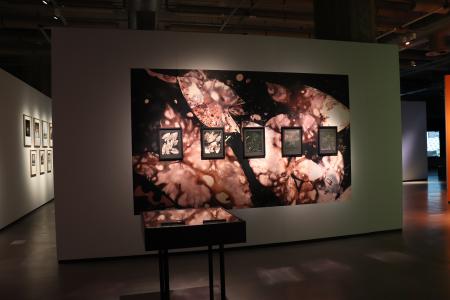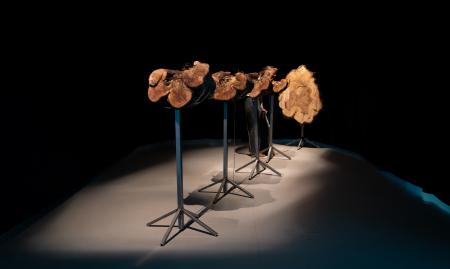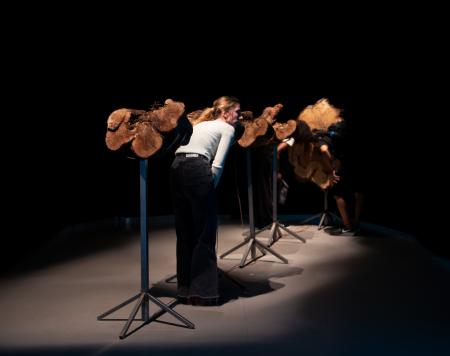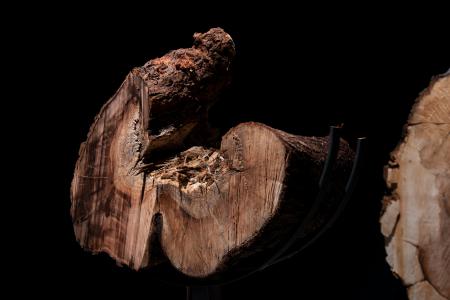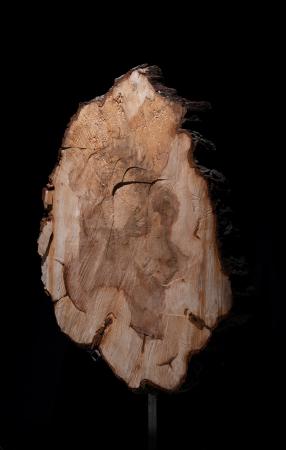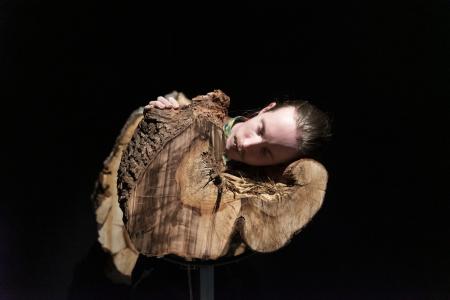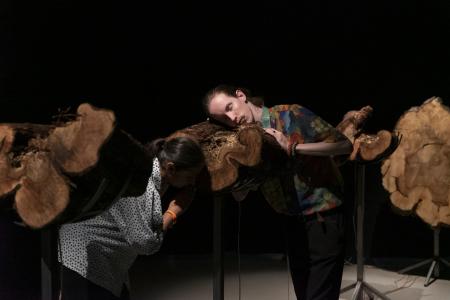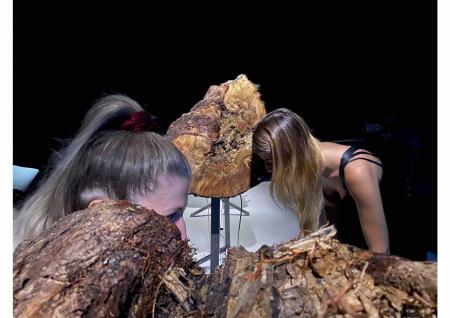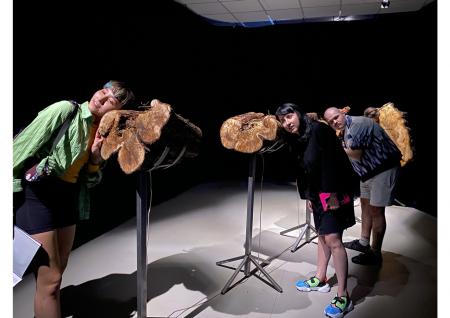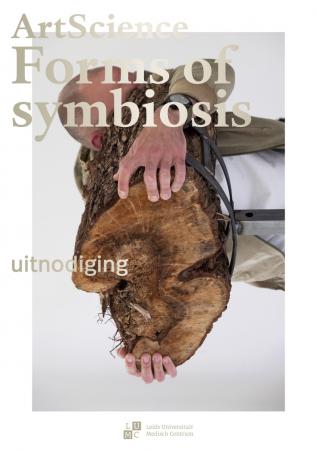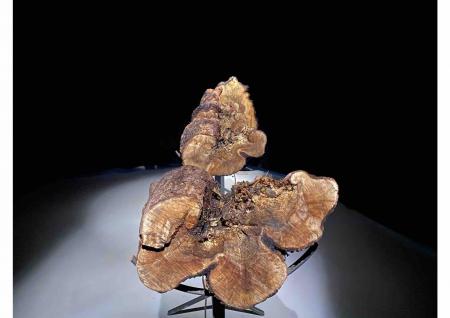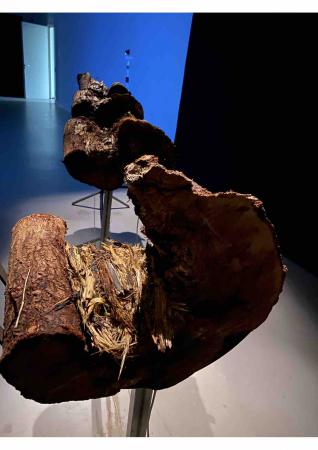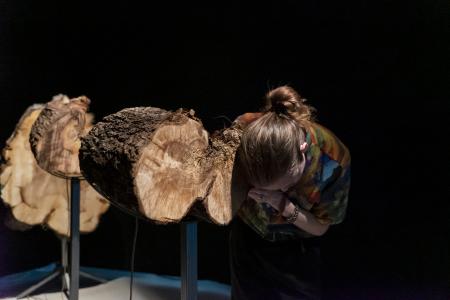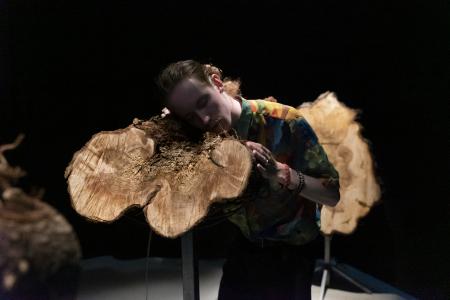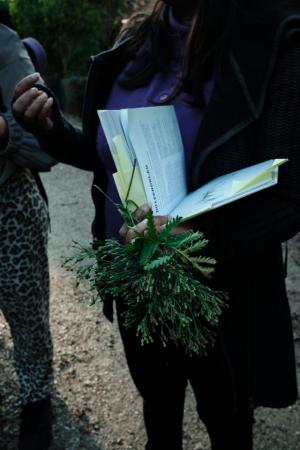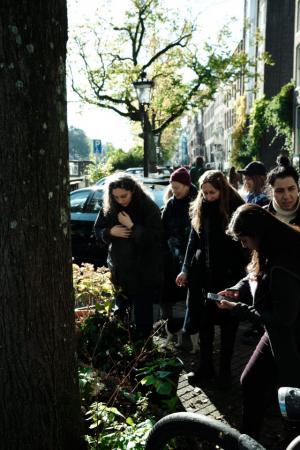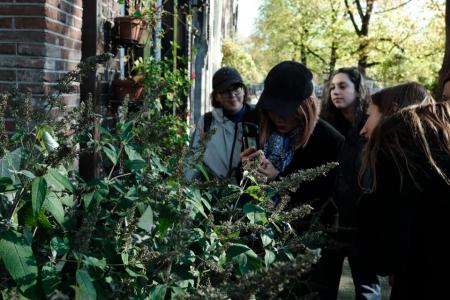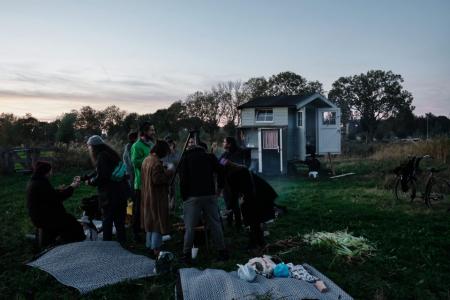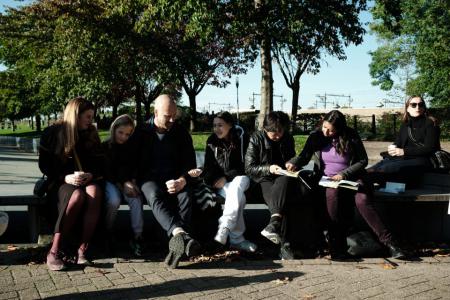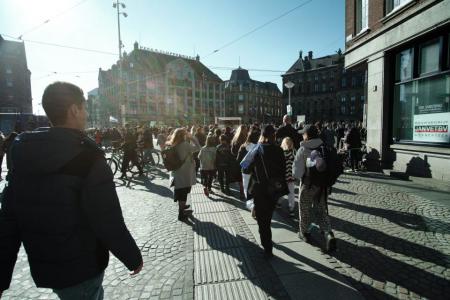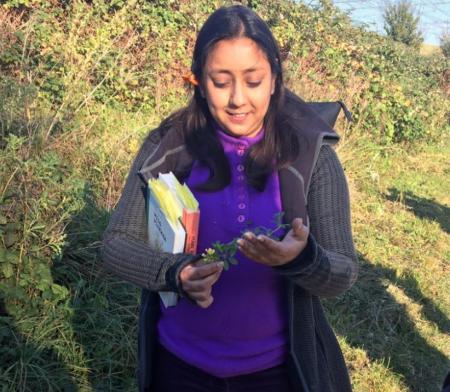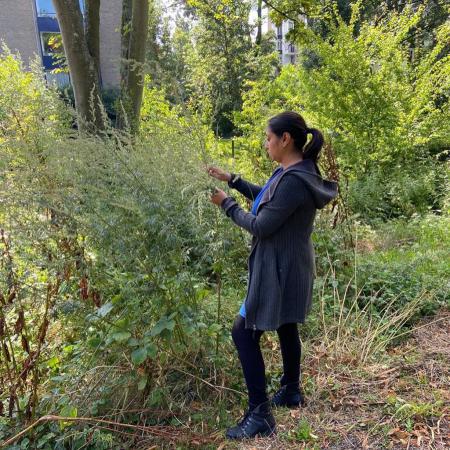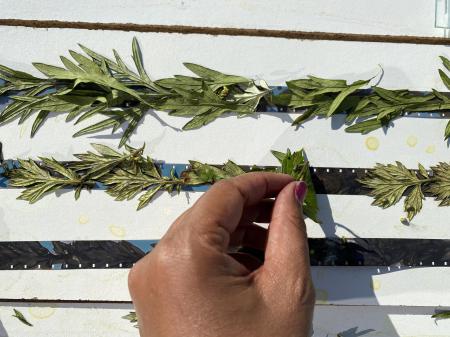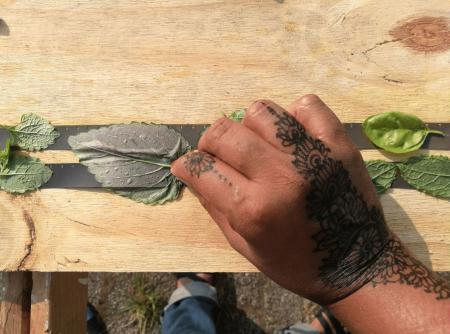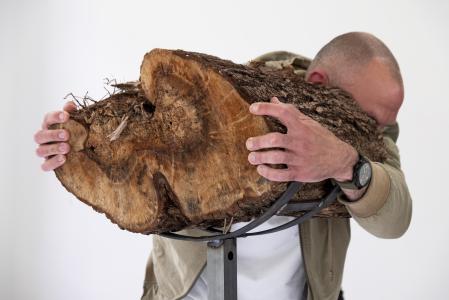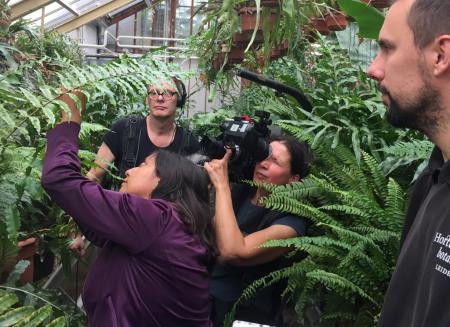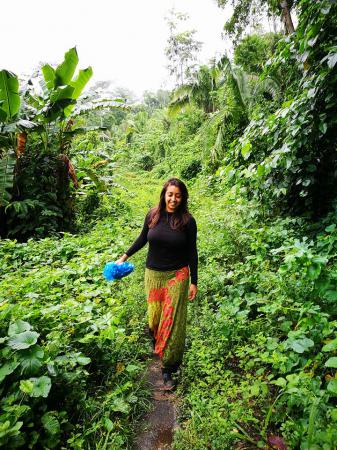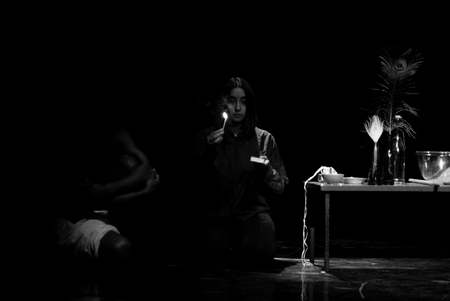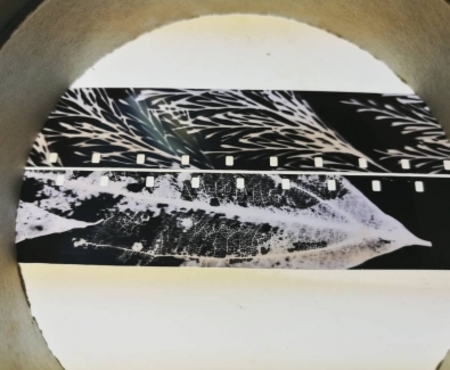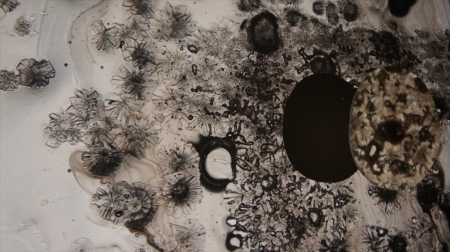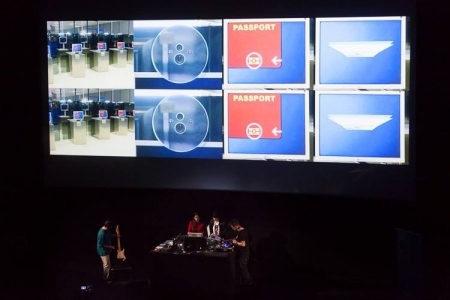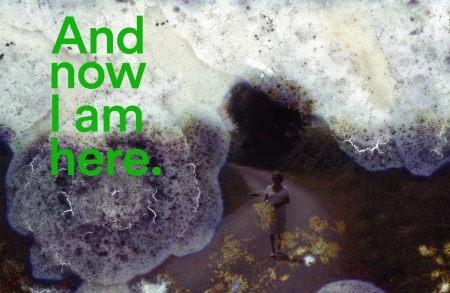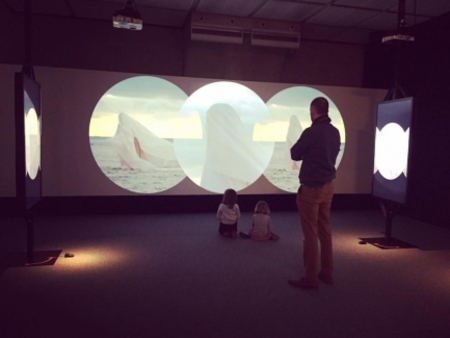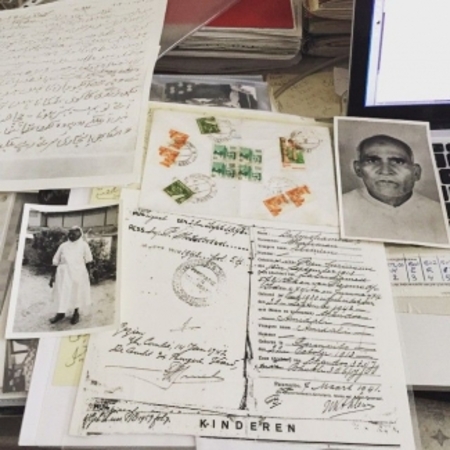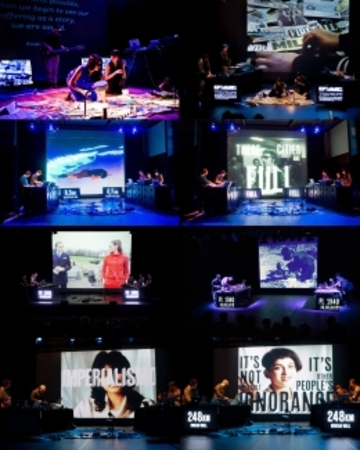-
info
Plantas Harmonias: connecting continents through medicinal and ritual plants is a solo exhibition in which Farah Rahman presents existing and new work that she continues to develop during the exhibition’s opening hours. Plantas Harmonias is part of a series of solo exhibitions at Zone2Source, in which artists share their artistic research and making processes with the public. The artist as ethnobotanist Farah’s artistic research practice is similar to the work of an ethnobotanist, who analyses complex relationships between plants, people and cultures through field research. In doing so, Farah starts from her own family history in Suriname and India. She creates mutlisensorial works involving long-forgotten memories and political and spiritual relationships between people and plants. How can we reshape our relationship to plants—other than as food sources or decoration—by connecting to the complex cultural meanings in which humans and plants are always intertwined?
-
info
Turmeric—also known as kurkuma, koenjit, hardi, haldi—has been cherished in Indian Siddha, Ayurvedic, Chinese, and Balinese plant medicine for over 4,500 years. It’s mentioned in ancient Sanskrit texts, Greek and Egyptian scriptures, revered for its spiritual, energetic, medicinal qualities, and vibrant natural dyes. Turmeric’s journey to Europe was marked by colonialism, but its sacred yellow color remains a symbol of spirituality across South Asian cultures. I’ve witnessed its significance firsthand at Hindu ceremonies, where it adorns clothes and flowers, and in Buddhist practices, where monks dye their robes with this sacred root. For me, turmeric carries deep personal meaning—the familiar masala scent takes me back to my mother’s kitchen, its part of my inner being and Surinamese Hindustani wedding ceremonies, where the bride and groom’s skin are rubbed in with haldi paste to ward off evil eye (Buri Nazar). This artwork was developed during my working residency and solo exhibit at Zone2Source last summer with the support of Mondriaan Fund. Photo by : Daniella Van Bergen
-
info
Opening day at the Podium Noord group exhibition!. I had the pleasure of preparing fresh apple, turmeric, ginger, and lemon juice for the audience, enhancing the experience of my multisensory artwork titled: ‘The Holy Color of Turmeric, the Sunlit Spice.’ ???? This artwork was developed during my solo exhibit at Zone2Source last summer. Turmeric, kurkuma, koenjit, hardi, haldi…this sunlit sacred spice has many names. Well known in Indian Ayurvedic, Chinese and Balinese plantmedicine potions and spiritual practices for more than 4500 years. Mentioned in ancient Sanskrit texts, Greek and Egyptian scriptures. Our ancestors, the herbalists of these times knew how to foster meaningful relationships between plants and humans. Learning from their plant teachers, growing together and cultivating kurkuma for its spiritual, energetic medicinal qualities and natural dyes. It was through colonialism the spice reached Europe. Nowadays the holy color yellow is still sacred in South Asian cultures and this powerful plant spirit has reached all over the world. I’ve attended Hindu ceremonies where the color is overal present in clothes and flowers. And in other life philosophy’s Buddhist munks dye their traditional robes with the sacred root. I’ve known this spice for its masala scent is locked into my inner being, it reminds me of my mothers cooking, the scent makes me feel at home and most recently from Surinamese Hindustani family wedding ceremonies where the bride and groom are rubbed in with a haldi paste. The reason why a haldi ritual is used is to rid the couple of Buri Nazar, the Sanskrit term for evil eye. Photo by : Daniella Van Bergen
-
info
Turmeric—also known as kurkuma, koenjit, hardi, haldi—has been cherished in Indian Siddha, Ayurvedic, Chinese, and Balinese plant medicine for over 4,500 years. It’s mentioned in ancient Sanskrit texts, Greek and Egyptian scriptures, revered for its spiritual, energetic, medicinal qualities, and vibrant natural dyes. Turmeric’s journey to Europe was marked by colonialism, but its sacred yellow color remains a symbol of spirituality across South Asian cultures. I’ve witnessed its significance firsthand at Hindu ceremonies, where it adorns clothes and flowers, and in Buddhist practices, where monks dye their robes with this sacred root. For me, turmeric carries deep personal meaning—the familiar masala scent takes me back to my mother’s kitchen, its part of my inner being and Surinamese Hindustani wedding ceremonies, where the bride and groom’s skin are rubbed in with haldi paste to ward off evil eye (Buri Nazar). This artwork was developed during my working residency and solo exhibit at Zone2Source last summer with the support of Mondriaan Fund. Photo by : Daniella Van Bergen
-
info
Bringing together medicinal plants, mushroom spores, light, smell and rotating frames, Rahman explores the possibilities of transforming light in a intimate meditative setting. Connecting memories of ancestors with found medicinal plants. Highlighting medicinal mushrooms foraged locally combined with plant compositions from Surinam that have cultural, spiritual, medicinal signifigance. By incorporating these plants and mushrooms Rahmann explores and strenghtens her ties with her background and connects with the resilience of her ancestors as wel as the plant knowledge thats had been passed down from colonial times.
-
info
Bringing together medicinal plants, mushroom spores, light, smell and rotating frames, Rahman explores the possibilities of transforming light in a intimate meditative setting. Connecting memories of ancestors with found medicinal plants. Highlighting medicinal mushrooms foraged locally combined with plant compositions from Surinam that have cultural, spiritual, medicinal signifigance. By incorporating these plants and mushrooms Rahmann explores and strenghtens her ties with her background and connects with the resilience of her ancestors as wel as the plant knowledge thats had been passed down from colonial times.
-
info
Self made incense as a way to create a welcoming stillness enviroment for the audience to smell. In particular to honour the ancestors who acknowlegde the use of plant medicine. The incense is made with herbs from colonial times (like cinnamon, cloves) and is made by the performers with good intentions in preparation of this ritual. (in collaboration with dancer/performer Fazle Shairmahomed.)
-
info
Bringing together medicinal plants, mushroom spores, light, smell and rotating frames, Rahman explores the possibilities of transforming light in a intimate meditative setting. Connecting memories of ancestors with found medicinal plants. Highlighting medicinal mushrooms foraged locally combined with plant compositions from Surinam that have cultural, spiritual, medicinal signifigance. By incorporating these plants and mushrooms Rahmann explores and strenghtens her ties with her background and connects with the resilience of her ancestors as wel as the plant knowledge thats had been passed down from colonial times.
-
info
Remembering the attentive participation of the audience during the ritual. After Fazle and I left, the audience passed on the ritualwashing of hands to each other. These kinds of special gathering moments can’t be rehearsed. There were many impressive moments, appropriate to the time and space we were in. (in collaboration with dancer/performer Fazle Shairmahomed.)
-
info
Bringing together medicinal plants, mushroom spores, light, smell and rotating frames, Rahman explores the possibilities of transforming light in a intimate meditative setting. Connecting memories of ancestors with found medicinal plants. Highlighting medicinal mushrooms foraged locally combined with plant compositions from Surinam that have cultural, spiritual, medicinal signifigance. By incorporating these plants and mushrooms Rahmann explores and strenghtens her ties with her background and connects with the resilience of her ancestors as wel as the plant knowledge thats had been passed down from colonial times.
-
info
Audience passing on the ritual washing of hands to each other. The water contains rosewater and reckit blue. This blue powder is used in surinamese rituals called wasi’s and is also used in surinamese hindustani culture. We were washed as babies in blue water. The color blue comes originally from the indigo fera plant which is brought from africa by the people that were made into slaves. They used it as a protection against the ‘evil eye’. This custom is still caried out today by many surinamese creole /hindustani. (In collaboration with dancer/performer Fazle Shairmahomad, photo by Sandra Uittenbogaard)
-
info
Audience passing on the ritual washing of hands to each other. The water contains rosewater and reckit blue. This blue powder is used in surinamese rituals called wasi’s and is also used in surinamese hindustani culture. We were washed as babies in blue water. The color blue comes originally from the indigo fera plant which is brought from africa by the people that were made into slaves. They used it as a protection against the ‘evil eye’. This custom is still caried out today by many surinamese creole /hindustani. (In collaboration with dancer/performer Fazle Shairmahomad, photo by Sandra Uittenbogaard)
-
info
Bringing together medicinal plant prints, mushroom spores, light, smell and rotating frames, Rahman explores the possibilities of transforming light in a intimate meditative setting. Connecting memories of ancestors with found medicinal plants. Highlighting medicinal mushrooms foraged locally combined with plant compositions from Surinam that have cultural, spiritual, medicinal signifigance. By incorporating these plants and mushrooms Rahmann explores and strenghtens her ties with her background and connects with the resilience of her ancestors as wel as the plant knowledge thats had been passed down from colonial times.
-
info
Bringing together medicinal plant prints, mushroom spores, light, smell and rotating frames, Rahman explores the possibilities of transforming light in a intimate meditative setting. Connecting memories of ancestors with found medicinal plants. Highlighting medicinal mushrooms foraged locally combined with plant compositions from Surinam that have cultural, spiritual, medicinal signifigance. By incorporating these plants and mushrooms Rahmann explores and strenghtens her ties with her background and connects with the resilience of her ancestors as wel as the plant knowledge thats had been passed down from colonial times.
-
info
Bringing together medicinal plant prints, mushroom spores, light, smell and rotating frames, Rahman explores the possibilities of transforming light in a intimate meditative setting. Connecting memories of ancestors with found medicinal plants. Highlighting medicinal mushrooms foraged locally combined with plant compositions from Surinam that have cultural, spiritual, medicinal signifigance. By incorporating these plants and mushrooms Rahmann explores and strenghtens her ties with her background and connects with the resilience of her ancestors as wel as the plant knowledge thats had been passed down from colonial times.
-
info
Bringing together medicinal plant prints, mushroom spores, light, smell and rotating frames, Rahman explores the possibilities of transforming light in a intimate meditative setting. Connecting memories of ancestors with found medicinal plants. Highlighting medicinal mushrooms foraged locally combined with plant compositions from Surinam that have cultural, spiritual, medicinal signifigance. By incorporating these plants and mushrooms Rahmann explores and strenghtens her ties with her background and connects with the resilience of her ancestors as wel as the plant knowledge thats had been passed down from colonial times.
-
info
In Curcuma Longa Characters verbindt Farah Rahman de heilige kleur geel van kurkuma planten die vanuit de koloniale geschiedenis in het Westen terechtkwamen met het rituele verhaal van familie en (haar) voorouders (India, Suriname) en gebruikt zij alternatieve foto technieken met kurkuma als lichtgevoelige stof. Tijdens haar werkperiode maakte zij connectie met medicinale planten uit het Amstelpark en ging zij in dialoog met bezoekers die kurkuma gebruiken. Op de ramen van de gallery maakte zij notities. Farah werkt hierin als ethnobotanist die spirituele medicinale rituele gebruiken en cultuur rondom planten bestudeerd.
-
info
In Curcuma Longa Characters verbindt Farah Rahman de heilige kleur geel van kurkuma planten die vanuit de koloniale geschiedenis in het Westen terechtkwamen met het rituele verhaal van familie en (haar) voorouders (India, Suriname) en gebruikt zij alternatieve foto technieken met kurkuma als lichtgevoelige stof. Tijdens haar werkperiode maakte zij connectie met medicinale planten uit het Amstelpark en ging zij in dialoog met bezoekers die kurkuma gebruiken. Op de ramen van de gallery maakte zij notities. Farah werkt hierin als ethnobotanist die spirituele medicinale rituele gebruiken en cultuur rondom planten bestudeerd.
-
info
In Curcuma Longa Characters verbindt Farah Rahman de heilige kleur geel van kurkuma planten die vanuit de koloniale geschiedenis in het Westen terechtkwamen met het rituele verhaal van familie en (haar) voorouders (India, Suriname) en gebruikt zij alternatieve foto technieken met kurkuma als lichtgevoelige stof. Tijdens haar werkperiode maakte zij connectie met medicinale planten uit het Amstelpark en ging zij in dialoog met bezoekers die kurkuma gebruiken. Op de ramen van de gallery maakte zij notities. Farah werkt hierin als ethnobotanist die spirituele medicinale rituele gebruiken en cultuur rondom planten bestudeerd.
-
info
In Curcuma Longa Characters verbindt Farah Rahman de heilige kleur geel van kurkuma planten die vanuit de koloniale geschiedenis in het Westen terechtkwamen met het rituele verhaal van familie en (haar) voorouders (India, Suriname) en gebruikt zij alternatieve foto technieken met kurkuma als lichtgevoelige stof. Tijdens haar werkperiode maakte zij connectie met medicinale planten uit het Amstelpark en ging zij in dialoog met bezoekers die kurkuma gebruiken. Op de ramen van de gallery maakte zij notities. Farah werkt hierin als ethnobotanist die spirituele medicinale rituele gebruiken en cultuur rondom planten bestudeerd.
-
info
In Curcuma Longa Characters verbindt Farah Rahman de heilige kleur geel van kurkuma planten die vanuit de koloniale geschiedenis in het Westen terechtkwamen met het rituele verhaal van familie en (haar) voorouders (India, Suriname) en gebruikt zij alternatieve foto technieken met kurkuma als lichtgevoelige stof. Tijdens haar werkperiode maakte zij connectie met medicinale planten uit het Amstelpark en ging zij in dialoog met bezoekers die kurkuma gebruiken. Op de ramen van de gallery maakte zij notities. Farah werkt hierin als ethnobotanist die spirituele medicinale rituele gebruiken en cultuur rondom planten bestudeerd.
-
info
In Curcuma Longa Characters verbindt Farah Rahman de heilige kleur geel van kurkuma planten die vanuit de koloniale geschiedenis in het Westen terechtkwamen met het rituele verhaal van familie en (haar) voorouders (India, Suriname) en gebruikt zij alternatieve foto technieken met kurkuma als lichtgevoelige stof. Tijdens haar werkperiode maakte zij connectie met medicinale planten uit het Amstelpark en ging zij in dialoog met bezoekers die kurkuma gebruiken. Op de ramen van de gallery maakte zij notities. Farah werkt hierin als ethnobotanist die spirituele medicinale rituele gebruiken en cultuur rondom planten bestudeerd.
-
info
In Curcuma Longa Characters verbindt Farah Rahman de heilige kleur geel van kurkuma planten die vanuit de koloniale geschiedenis in het Westen terechtkwamen met het rituele verhaal van familie en (haar) voorouders (India, Suriname) en gebruikt zij alternatieve foto technieken met kurkuma als lichtgevoelige stof. Tijdens haar werkperiode maakte zij connectie met medicinale planten uit het Amstelpark en ging zij in dialoog met bezoekers die kurkuma gebruiken. Op de ramen van de gallery maakte zij notities. Farah werkt hierin als ethnobotanist die spirituele medicinale rituele gebruiken en cultuur rondom planten bestudeerd.
-
info
Nederlands Fotomuseum
-
info
Nederlands Fotomuseum
-
info
Nederlands Fotomuseum. Fragment waarin hij beschrijft hoe hij op een zeker moment malaria opliep op de Surinaamse plantage waar hij werkte als opzichter. Hij nam een plantenmedicijn in, dat sterk naar djiera (=komijn) rook en waar de kwasibita-plant (bitterhout) in was verwerkt. Na drie weken was hij genezen.
-
info
Nederlands Fotomuseum. Fragment waarin hij beschrijft hoe hij op een zeker moment malaria opliep op de Surinaamse plantage waar hij werkte als opzichter. Hij nam een plantenmedicijn in, dat sterk naar djiera (=komijn) rook en waar de kwasibita-plant (bitterhout) in was verwerkt. Na drie weken was hij genezen.
-
info
Nederlands Fotomuseum. Biochemisch proces tussen vers plantenmateriaal en andere organische ingrediënten. Hieruit ontstaat een organische foto ontwikkelaar voor analoge fotografie. De planten worden op fotopapier belicht d.m.v. zonlicht.
-
info
Nederlands Fotomuseum. Biochemisch proces tussen vers plantenmateriaal en andere organische ingrediënten. Hieruit ontstaat een organische foto ontwikkelaar voor analoge fotografie. De planten worden op fotopapier belicht d.m.v. zonlicht.
-
info
Archief foto van overgrootvader Munshi Rahman Khan
-
info
Biochemisch proces tussen vers plantenmateriaal en andere organische ingrediënten. Hieruit ontstaat een organische foto ontwikkelaar voor analoge fotografie. De planten worden op fotopapier belicht d.m.v. zonlicht.
-
info
Biochemisch proces tussen vers plantenmateriaal en andere organische ingrediënten. Hieruit ontstaat een organische foto ontwikkelaar voor analoge fotografie. De planten worden op fotopapier belicht d.m.v. zonlicht.
-
info
Nederlands Fotomuseum. Biochemisch proces tussen vers plantenmateriaal en andere organische ingrediënten. Hieruit ontstaat een organische foto ontwikkelaar voor analoge fotografie. De planten worden op fotopapier belicht d.m.v. zonlicht.
-
info
Nederlands Fotomuseum. Biochemisch proces tussen vers plantenmateriaal en andere organische ingrediënten. Hieruit ontstaat een organische foto ontwikkelaar voor analoge fotografie. De planten worden op fotopapier belicht d.m.v. zonlicht.
-
info
-
info
-
info
This work is part of an ongoing artistic research, making sensorial exercises on how to sense a thinking forest.
-
info
Imagining sensorial experience of other species and coming in physical contact. Subtle gestures, coming closer, relating, paying attention to sound, scent composition and texture of the tree as the other.
-
info
Imagining sensorial experience of other species and coming in physical contact. Subtle gestures, coming closer, relating, paying attention to sound, scent composition and texture of the tree as the other.
-
info
Imagining sensorial experience of other species and coming in physical contact. Subtle gestures, coming closer, relating, paying attention to sound, scent composition and texture of the tree as the other.
-
info
MA Art Science Graduation work nominated for the Waag Society Technology Award. Imagining sensorial experience of other species and coming in physical contact. Subtle gestures, coming closer, relating, paying attention to sound, scent composition and texture of the tree as the other.
-
info
MA Art Science Graduation work nominated for the Waag Society Technology Award. Imagining sensorial experience of other species and coming in physical contact. Subtle gestures, coming closer, relating, paying attention to sound, scent composition and texture of the tree as the other.
-
info
MA Art Science Graduation work nominated for the Waag Society Technology Award. Imagining sensorial experience of other species and coming in physical contact. Subtle gestures, coming closer, relating, paying attention to sound, scent composition and texture of the tree as the other.
-
info
MA Art Science Graduation work nominated for the Waag Society Technology Award. Imagining sensorial experience of other species and coming in physical contact. Subtle gestures, coming closer, relating, paying attention to sound, scent composition and texture of the tree as the other.
-
info
LUMC Leiden University Gallery
-
info
Imagining sensorial experience of other species and coming in physical contact. Subtle gestures, coming closer, relating, paying attention to sound, scent composition and texture of the tree as the other.
-
info
Imagining sensorial experience of other species and coming in physical contact. Subtle gestures, coming closer, relating, paying attention to sound, scent composition and texture of the tree as the other.
-
info
Imagining sensorial experience of other species and coming in physical contact. Subtle gestures, coming closer, relating, paying attention to sound, scent composition and texture of the tree as the other.
-
info
Imagining sensorial experience of other species and coming in physical contact. Subtle gestures, coming closer, relating, paying attention to sound, scent composition and texture of the tree as the other.
-
info
Moving from the center to the edge of the city, this slow walk will be accompanied by multimedia artist Farah Rahman, who will guide us through the wild plants and herbs we’ll encounter along the way. The route, approximately 8.8km long, will pass through the parks and ‘green spaces’ of Amsterdam. The walk is meant to be a space to learn collectively and share knowledge about the spaces we are walking through and the plants we encounter. Once we reach the Four Sisters, we’ll learn more about the garden and Muge’s experiences, and we’ll watch the sunset and eat together near the fire (with the little addition of our foraged herbs).
-
info
Moving from the center to the edge of the city, this slow walk will be accompanied by multimedia artist Farah Rahman, who will guide us through the wild plants and herbs we’ll encounter along the way. The route, approximately 8.8km long, will pass through the parks and ‘green spaces’ of Amsterdam. The walk is meant to be a space to learn collectively and share knowledge about the spaces we are walking through and the plants we encounter. Once we reach the Four Sisters, we’ll learn more about the garden and Muge’s experiences, and we’ll watch the sunset and eat together near the fire (with the little addition of our foraged herbs).
-
info
Moving from the center to the edge of the city, this slow walk will be accompanied by multimedia artist Farah Rahman, who will guide us through the wild plants and herbs we’ll encounter along the way. The route, approximately 8.8km long, will pass through the parks and ‘green spaces’ of Amsterdam. The walk is meant to be a space to learn collectively and share knowledge about the spaces we are walking through and the plants we encounter. Once we reach the Four Sisters, we’ll learn more about the garden and Muge’s experiences, and we’ll watch the sunset and eat together near the fire (with the little addition of our foraged herbs).
-
info
Moving from the center to the edge of the city, this slow walk will be accompanied by multimedia artist Farah Rahman, who will guide us through the wild plants and herbs we’ll encounter along the way. The route, approximately 8.8km long, will pass through the parks and ‘green spaces’ of Amsterdam. The walk is meant to be a space to learn collectively and share knowledge about the spaces we are walking through and the plants we encounter. Once we reach the Four Sisters, we’ll learn more about the garden and Muge’s experiences, and we’ll watch the sunset and eat together near the fire (with the little addition of our foraged herbs).
-
info
Moving from the center to the edge of the city, this slow walk will be accompanied by multimedia artist Farah Rahman, who will guide us through the wild plants and herbs we’ll encounter along the way. The route, approximately 8.8km long, will pass through the parks and ‘green spaces’ of Amsterdam. The walk is meant to be a space to learn collectively and share knowledge about the spaces we are walking through and the plants we encounter. Once we reach the Four Sisters, we’ll learn more about the garden and Muge’s experiences, and we’ll watch the sunset and eat together near the fire (with the little addition of our foraged herbs).
-
info
Moving from the center to the edge of the city, this slow walk will be accompanied by multimedia artist Farah Rahman, who will guide us through the wild plants and herbs we’ll encounter along the way. The route, approximately 8.8km long, will pass through the parks and ‘green spaces’ of Amsterdam. The walk is meant to be a space to learn collectively and share knowledge about the spaces we are walking through and the plants we encounter. Once we reach the Four Sisters, we’ll learn more about the garden and Muge’s experiences, and we’ll watch the sunset and eat together near the fire (with the little addition of our foraged herbs).
-
info
Moving from the center to the edge of the city, this slow walk will be accompanied by multimedia artist Farah Rahman, who will guide us through the wild plants and herbs we’ll encounter along the way. The route, approximately 8.8km long, will pass through the parks and ‘green spaces’ of Amsterdam. The walk is meant to be a space to learn collectively and share knowledge about the spaces we are walking through and the plants we encounter. Once we reach the Four Sisters, we’ll learn more about the garden and Muge’s experiences, and we’ll watch the sunset and eat together near the fire (with the little addition of our foraged herbs).
-
info
-
info
-
info
-
info
The tactility, scents and soundscapes sent through the wooden logs start working when the visitor’s ears are pressed against the wooden logs.
-
info
Anushtaan try-out performance in WORM Rotterdam.
-
info
-
info
-
info
Anushtaan a decolonising ritual. In samenwerking met Fazle Shairmahomad.
-
info
16mm analog film projector's are used as a research instrument to examine form, structure and patterns in cuttings from tropical plants. A first version was shown as installation during the Analog Film and Sound festival at WORM Filmwerkplaats Rotterdam.
-
info
Performed at HOOGTIJ, Holaa Festival Den Haag, Roodkapje Winterwolven Festival. Sarkaragraphy, an exploration of specific states of sugar' is a interdisciplinary research project observing the interaction/reflection between audiences and the art work. How does the audience's emotion interwind with smell, temperature, concentration and disorientation? Wen Chin Fu and Farah Rahman will be making glass sugar slides on the spot. Melting the sugar and combining mixtures of sugar in specific state, inks and oils poured onto the glass slides. The glass slides will be projected through an old analog slide projector. The heat of the projector lamp plays a big role, it transforms the sugar emulsion, it melts. This process can be seen by magnified projections on a big white backdrop.
-
info
How does the media portray immigrants? Performed at Framer Framed Gallery Ams, Biennale van Venetië preview days Realise - the resilience of art in liquid crises, EYE Film Institute, European Cultural Foundation Amsterdam, Creative Commons Festival at Museu D’Art Contemporani De Barcelona & Madrid at La Casa Encendida
-
info
Vertoond in Europe by People, Muziekgebouw aan het IJ, Compagnie Theater. ‘And now I am here’ is ontwikkeld i.s.m. Creative Court. Het is een reflectieve video-installatie die vanuit verschillende perspectieven gevoelens van ontheemding bevraagt. Interviewfragmenten en filosofische citaten vermengen zich met beelden van videokunstenaar Farah Rahman, die ‘found footage’ deconstrueert en laadt met nieuwe associaties. Migratie is een terugkerend thema in haar werk.
-
info
-
info
De basis van ‘Het geluk daar is niet zoals hier’ is een grote hoeveelheid audiomateriaal uit het interviewproject Ongekend Bijzonder. Circa 50 tot 60 interviewfragmenten zijn gemixt met eigen film opnames. In samenwerking met tentoonstellingsvormgever Mark Ridder, GRNDPA film productie, Ongekend Bijzonder Festival en Museon Den Haag. Bezoekers kunnen de ‘samples’ zelf afwisselen op verschillende schermen. Zo ontstaat een dynamisch beeld dat steeds verandert door de keuzes van de bezoekers.
-
info
Mediakunstenaar Farah Rahman duikt in audiovisueel materiaal van privépersonen van Hindostaanse afkomst - persoonlijke registraties in film, video en foto. Zij verwerkt deze tot een unieke live cinema performance vol indringende beelden en live muziek, gespeeld door een bijzonder gezelschap van musici, die zijn oorsprong vindt in de geluiden van de oude landen India en Suriname. De Hindoestaanse gemeenschap neemt een belangrijke plaats in binnen de Haagse gemeenschap. Haar wortels strekken zich uit over drie continenten: India, Suriname en Nederland. De ‘Lalla Rookh’ (letterlijk: Roze Wang) is het zeilschip waarmee op 5 juni 1873 de eerste Brits-Indische immigranten voet aan wal zetten in Suriname. Farah Rahman - regie, beeld scenario, montage Andro Biswane - gitaar Klaas Hekman - fluit Satyakam Mohkamsing - Indiase viool Sandhya Sanjana - zang Wieland Eggermont - muzikale leiding
-
info
Performed at British Film Institute, Mapping Festival Geneve, DokuFest Kosovo, Imagining Europe De Balie Amsterdam, ZEMOS98 Festival in Sevilla, Hondakin Festival in Bilbao, S8 Festival in La Coruña. Research, de-constructie van archief materialen uit Internationale archieven o.a.Het Nationaal Archief, Instituut voor Beeld en Geluid (NL), British Filminstitute (BFI). Een zoektocht naar nieuwe narratieven.
Websites
Social media
Member of Artists’ Initiative/Collective/Incubator
Masala Movement & Filmwerkplaats WORM Rotterdam.
Member of a professional association/artists’ association
Stroom Den Haag
Curriculum vitae
Education
-
2019 - 2022Master Art Science Den Haag, Koninklijke Academie van Beeldende Kunsten diploma
-
2002 - 2007HBO Audiovisuele Vormgeving Rotterdam, Willem de Kooning Academie diploma
-
1996 - 2000Grafische vormgeving Grafisch Lyceum Rotterdam diploma
-
2016Scent creation, distilling, ol factory scent performance Mediamatic Amsterdam.Klara Rabat, Maki Ueda
-
2016Workshop The Film Projector as an instrument worm filmwerkplaats rotterdam
-
2018Workshop Movin slides worm filmwerkplaats rotterdam
-
2012Workshop scenario schrijven ZEMOS98 Sevilla Spanje
-
2006Workshop Super 8 film Willem de Kooning academie, Frank de Bruin Super8 lab
-
2017Introductory 16mm film workshop worm filmwerkplaats rotterdam
-
2018Workshop Perfume Mediamatic Amsterd
-
--Workshop Soap Mediamatic Amsterdam.Klara Rabat, Maki Ueda
exhibitions
-
2024Stroom Den Haag Den Haag, Netherlands Positions: Soft Intimacies. (Review except from Metropolis M magazine about the exhibit.) Indigo reappears in Farah Rahman’s botanical research which includes a cinematic installation, archival materials, recipes and written reflections. Diapositives rhythmically rotate on a slide projector, transferring images of plants on the walls. Entitled Grantangi Plant Medicine (Thank you plant medicine), Rahman’s work honours the ancestors who revered the healing power of plants, invoking their guidance. The artist imbues meaning into the indigo-blue colour, which she employs as a protective shield. ‘Creole Surinamese people have a tradition of taking herbal baths with the indigofera plant to protect themselves against evil spirits’, Rahman writes in a text accompanying the work. ‘We were washed in blue waters as babies. It connects to our hybrid identity’. She also traces the historical journey of indigo, highlighting its presence on Surinamese plantations due to the forced displacement of enslaved people from Africa. Collecting the plants and medicinal mushrooms locally in the Hague, Rahman seeks to revive forgotten practices, strengthening her ties with her ancestors and embracing the resilience inherent in these practices and traditions. metropolism.com/nl/recensie/the-gaps-and-grasps-from-positions-soft-intimacies-at-stroom-den-haag/ Group
-
2024Podium Noord The Hague, Netherlands In het blauwe huisje in wijkpark de Horst is deze zomer een expositie te zien van hedendaagse kunstenaars. Deelnemende kunstenaars: Paul Combrink, Maria Ilieva, Farah Rahman en Emma Sebregts, Since Today (Gwenda Jakobs en Jonathan Looman). Podium NOORD kan sinds kort tijdelijk gebruik maken van het befaamde blauwe huisje in het park net achter het winkelcentrum Het Kleine Loo. Als een van de eerste activiteiten geeft zij nu de ruimte aan kunstenaars om de lege ruimte optimaal te benutten. De werken variëren van installaties, schilderijen, tekeningen tot een ingreep in de ruimte. podiumnoord.nl/productie/expositie-blauwhout/4729/ Group
-
2024Positions: Soft Intimacies Stroom Den Haag Den Haag, Netherlands Positions: Soft Intimacies is een groepstentoonstelling van vijf Haagse kunstenaars die werken op het snijvlak van spiritualiteit, ecologie, cultureel erfgoed en mondelinge geschiedenis. Eugenie Boon, Yaïr Callender, Haevan Lee, Farah Rahman en Amber Toorop nodigen de bezoeker uit om de ambiguïteit van persoonlijke en collectieve manieren van herinneren te verkennen. Hun artistieke praktijk is gevormd door poëtische reflecties, ontleend aan persoonlijke ervaringen en achtergronden. stroom.nl/activiteiten/tentoonstelling.php?t_id=4468688 Group
-
2023Solo Exhibit, Plantas Harmonias: connecting continents through medicinal and ritual plants Zone2source Amsterdam, Netherlands Plantas Harmonias: connecting continents through medicinal and ritual plants is a solo exhibition in which Farah Rahman presents existing and new work that she continues to develop during the exhibition’s opening hours. Plantas Harmonias is part of a series of solo exhibitions at Zone2Source, in which artists share their artistic research and making processes with the public. The artist as ethnobotanist Farah’s artistic research practice is similar to the work of an ethnobotanist, who analyses complex relationships between plants, people and cultures through field research. In doing so, Farah starts from her own family history in Suriname and India. She creates mutlisensorial works involving long-forgotten memories and political and spiritual relationships between people and plants. How can we reshape our relationship to plants—other than as food sources or decoration—by connecting to the complex cultural meanings in which humans and plants are always intertwined? The world exhibition The Amstelpark was created for a world horticultural exhibition, the 1972 Floriade: a typical modern colonial phenomenon where plants, animals and people are taken out of context and detached from their traditions and relationships. In Plantas Harmonias, Farah Rahman explores the cultural meanings of trees and plants from various places around the world and incorporates them into new artworks. The exhibition as a place for collective research For Plantas Harmonias, Farah takes visitors along to collectively explore during her working sessions in the exhibition space, workshops and expeditions in the Amstelpark. This way, the exhibition becomes a place for presentation and fieldwork, with the Amstelpark as a laboratory for collective research into the complex (post)colonial relationships between people and plants. Willows and Spores Presented in the exhibition is an installation of five treetrunks, Sensing Willow, which is an investigation into how a forest can be felt and experienced by listening to the sound of the tree and its surroundings. In the back space you can find the installation Symphony of Spores, which projects organic materials into the space. Another part of the exhibition is set up as a workshop, where each weekend Farah will develop her new research projects. Towards the end of the exhibition, Farah will research into the relationships and migration of the plants in the Amstelpark. zone2source.net/tentoonstelling/plantas-harmonias/ Solo
-
2022Djiera Nederlands Fotomuseum Rotterdam, Netherlands In her Djiera (‘Cumin’) series, Farah Rahman focuses on medicinal plants that found their way to her birth city of The Hague as a result of Dutch colonial history. She seeks to link them to the autobiographical story of her great-grandfather, Munshi Rahman Khan. The Dijera series consists of plant compositions featuring djiera, tajerblad (arrowleaf elephant ear),okra and sopropo: plants that Rahman buys at the main open-air market in The Hague and often uses in her cooking. Her photographs employ the analogue phytogram method: first a biochemical process using reactions between fresh plant material and other organic ingredients is used to produce an organic developing fluid. Rahman then creates her images by exposing the plants directly on photographic paper using sunlight. By employing these plants in her work, Rahman explores and reinforces her relationship to her historical cultural background. She connects in this way with the spirituality of plants, the resilience of past generations of her family, and the knowledge of medicinal plants that they carried with them in the colonial era and passed on to later generations. www.nederlandsfotomuseum.nl/tentoonstelling/verbeelding/ Group
-
20218.8 kilometers – A walk from W139 to Four Sisters W139 - presentation and production space for contemporary art Amsterdam, Netherlands Moving from the center to the edge of the city, this slow walk will be accompanied by multimedia artist Farah Rahman, who will guide us through the wild plants and herbs we’ll encounter along the way. The route, approximately 8.8km long, will pass through the parks and ‘green spaces’ of Amsterdam. The walk is meant to be a space to learn collectively and share knowledge about the spaces we are walking through and the plants we encounter. Once we reach the Four Sisters, we’ll learn more about the garden and Muge’s experiences, and we’ll watch the sunset and eat together near the fire (with the little addition of our foraged herbs). w139.nl/en/event-8-8-kilometers-a-walk-from-w139-to-four-sisters/ Group
-
2021Sensing Willow Royal Academy of Art - MA Art Science Graduation Show The Hague, Netherlands MA Art Science graduation work nominated for the Waag Technology and Society award. ‘During many lockdown walks in Meijendel’s constructed nature area I experimented with non-human relationships and other forms of listening by recording tree sounds via hydrophone and piezo microphones. These fieldrecordings are being transported through the wood in my installation. The work invites the audience to experience and imagine the sensorial experience of other species. By coming in physical contact with the wooden logs, subtle gestures to come closer and to relate and pay attention to the sound, scent composition and the texture of the tree as the other.’ This work is part of an ongoing artistic research on how to sense a thinking forest. Listening to trees is part of a thinking and making process started by walking and wandering around in this area, sharpening my senses through my working method: different self made sensorial exercises. By exploring and perceiving the landscape around me I sat still, touched, smelled, looked, listened and interacted with my surroundings. fariatie.tumblr.com/Sensing%20Willow Group
-
2019Anushthan - A Decolonizing Ritual Korzo Theatre and Vaillant Theatre The Hague, Netherlands In the name of our ancestors who have survived indentured labor and colonialism, and those who revolted against exploitation, oppression and dehumanization. Through this ritual where we make use of custom made henna rituals / self made incense / dance /light / sound that i made together with Fazle Shairmahomed , Devika Chotoe, Ludmila Rodrigues, An3 and Fred Janssen. We follow the footsteps of our ancestors in the fight for decolonization. Guided by the beats and sounds of ‘..Formerly known as..’ they set off on a journey towards the past to create healing for the future. The mechanisms and effects from the colonial past can still be felt, and through this ritual they create a joint moment to bring about healing and call for recognition of a shared history. www.tinamustao.com/2019/10/06/anushthan/ Group
-
2016'Sarkaragraphy' exploring specific states of sugar HOOGTIJ, Holaa Festival Den Haag, Roodkapje Winterwolven Festival Den Haag en Rotterdam, Netherlands Glass slide projections. A sugar crystal scented installation developed together with artist Wen Chin Fu. What does an audience feel when intertwined with scent and the enlarged projections of sugar crystals transforming slowly before their eyes? fariatie.tumblr.com/Sarkaragraphy Duo
-
2016'And now I am here' Europe by People, Muziekgebouw aan het IJ, Compagnie Theater Amsterdam Video installatie i.s.m. Creative Court. In 2015, two Dutch journalists went on a search for stories of statelessness in Europe. They came across complicated regulations, coping mechanisms and realism. Building on their findings, Creative Court developed ´And now I am here´, a poetic video installation, that questions feelings of displacement from various angles. Interview excerpts and quotes from literature and philosophy merge with the images of video artist Farah Rahman, whose work revolves around migration. fariatie.tumblr.com/andnowiamhere Duo
-
2016'Het geluk daar is niet zoals hier' MUSEON Den Haag, Ongekend Bijzonder Festival. Den Haag Audiovisuele Installatie/performance i.s.m. kunstenaar Mark Ridder. Van 16 april tot en met 21 mei 2016 programmeert het Museon de multimedia-installatie ‘Het geluk daar is niet zoals hier’, die bezoekers meeneemt in de gedachten van vluchtelingen over vrijheid en onvrijheid. Deze installatie is ontwikkeld door de mediakunstenaars Farah Rahman en Mark Ridder, die op een aantal zondagen ook live performances geven in het Museon. Zelf kiezen en mixen De basis van ‘Het geluk daar is niet zoals hier’ is een grote hoeveelheid audiomateriaal uit het interviewproject Ongekend Bijzonder. Circa 50 tot 60 interviewfragmenten zijn gemixt met eigen film opnames in samenwerking GRNDPA film productie. Bezoekers kunnen de ‘samples’ zelf afwisselen op verschillende schermen. Zo ontstaat een dynamisch beeld dat steeds verandert door de keuzes van de bezoekers. Duo
-
2016€urovisions Live Cinema Performance Framer Framed Gallery Ams, Biennale van Venetië preview days Realise - the resilience of art in liquid crises, EYE Film Institute, European Cultural Foundation Amsterdam, Creative Commons Festival at Museu D’Art Contemporani De Barcelona & Madrid at La Casa Encendida Group
-
2015Lalla Rookh Revisited Live Cinema Performance Zuiderstrand Theater, Dakota Theater, Vaillant Theater Group
-
2015Todays Art Festival The Hague and Roodkapje Winterwolven Festival Rotterdam Den Haag en Rotterdam, Netherlands Live video camerafeed performance Duo
-
2014Blikopener Festival Delft De Watertoren Delft Found Footage slide installation Duo
-
2012European Souvenirs Live Cinema Performance British Film Institute, Mapping Festival Geneve, DokuFest Kosovo, Imagining Europe De Balie Amsterdam, ZEMOS98 Festival in Sevilla, Hondakin Festival in Bilbao, S8 Festival in La Coruña Group
-
2011Polystyrene projections. Live videomapping performance Todays Art Festival BYOB, Fiber Festival Amsterdam, De Haagse Grote Kerk, De Nacht van de Hoop. Group
-
2008Award of Excellence at The World One Minute Exhibition. Beijng China (Contemporary Art museum) Brussels Belgium, Lisbon Portugal (Gulbenkian museum) Sao Paulo Brasil (Museum of Art) Vertoning van 'Cosmic-Giggle' en 'Oxygen2' op The World One Minute Exhibition Group
Projects
-
2024
Positions: Soft Intimacies Stroom Den Haag (NL) Den Haag, Netherlands stroom.nl/activiteiten/tentoonstelling.php?t_id=4468688 Positions: Soft Intimacies is een groepstentoonstelling van vijf Haagse kunstenaars die werken op het snijvlak van spiritualiteit, ecologie, cultureel erfgoed en mondelinge geschiedenis. Eugenie Boon, Yaïr Callender, Haevan Lee, Farah Rahman en Amber Toorop nodigen de bezoeker uit om de ambiguïteit van persoonlijke en collectieve manieren van herinneren te verkennen. Hun artistieke praktijk is gevormd door poëtische reflecties, ontleend aan persoonlijke ervaringen en achtergronden.
-
2023
Plantas Harmonias: connecting continents through medicinal and ritual plants is a solo exhibition Zone2Source Amsterdam, Netherlands zone2source.net/tentoonstelling/plantas-harmonias/ Plantas Harmonias: connecting continents through medicinal and ritual plants is een solotentoonstelling waarin Farah Rahman bestaand en nieuw werk presenteert dat ze tijdens openingstijden verder in het Amstelpark ontwikkelt. Plantas Harmonias maakt deel uit van een reeks solotentoonstellingen bij Zone2Source, waarin kunstenaars gevraagd worden het artistieke onderzoek en maakproces van hun werk met het publiek te delen. De kunstenaar als etnobotanist Farah’s artistieke onderzoekspraktijk is vergelijkbaar met het werk van een etnobotanist, die de complexe relaties tussen planten, volkeren en culturen analyseert door middel van veldonderzoek. Daarbij vertrekt ze vanuit haar eigen familiegeschiedenis in Suriname en India. Farah maakt multizintuigelijke werken waarin lang vergane herinneringen, politieke en spirituele relaties tussen mensen en planten een rol spelen. Hoe kunnen we onze relatie tot planten, anders dan als voedselbron of decoratie, opnieuw vorm geven in onze hedendaagse maatschappij vanuit de complexe culturele betekenissen waarin mens en plant verweven zijn?
-
2018
Anushtaan try-out performance Worm, Rotterdam Rotterdam, Netherlands vimeo.com/305043104 Trailer work-in-progress: https://vimeo.com/305043104 Password: ancestors2018
-
2018
Into the Great wide open Nederland, Vlieland, Netherlands
-
2016
Anthocyan - 16mm analog film projections installation Worm, Rotterdam Analog Film and Sound festival at WORM Filmwerkplaats Rotterdam, Netherlands 16mm analog film developer made with the use of bio chemistry plant processes. Exploring questions around the use of plants in colonial, medicinal and ritual acts and of environmental consciousness around analog photochemistry. The 16mm film projector's are used as a research instrument to examine form, structure and patterns in cuttings from plants.
-
2016
Deelname aan Open Atelier Route Noordwal 117 Vereniging Atelierroute
-
2014
-
2013
Organisatie en workshop @VLO Festival Noordwal 117 Vereniging Kunst recycle festival door kunstenaars voor kinderen van 5 tot 12 jaar.
-
2013
Curator and facilitator for the ‘Lost in Translation’ project in The Hague PIP Bink36 part of “STREETS: Mapping and Connecting Young Creative Scenes in Europe” Platform Spartak Den Haag Art Jam The Hague, NL and Artist participation in 'Stories behind the city' project in Vranje Serbia part of “STREETS: Mapping and Connecting Young Creative Scenes in Europe”
International exchanges/Residencies
-
2014Londen (UK) artists-in-residence Light Surgeons Studio 2012
-
2014Sevilla (Spain), artists-in-residence ZEMOS98 Festival
-
2014Malaga (Spain), artists-in-residence La Termica 2014
-
2012MODE Istanbul (Turkey), artists-in-residence
-
2012Warsaw (Poland), artists-in-residence The Association of the Creative Initiatives
Commissions
-
2014Filmhuis den haag 2013 Found footage promo video finished
-
2014Jordan Peak 2013 Found footage music video finished
-
2013Defected Records ft Dennis Ferrer 2011 Music video - Mind Ur Step finished
-
2013
-
2013Objektivity Music ft Dennis Ferrer New York, USA Music video - Mind Ur Dub finished
-
2011Premsela Instituut voor Fashion & Design Amsterdam, NL Korte documentaire over jonge modeontwerpers die met duurzame materialen werken. Vertoond op de Arnhem Fashion Biennale. finished
Publications
-
2012Interview European Souvenirs Live cinema performance Fiber Festival 2021 Media art website & Festival
-
2012A.k.a. The Life of The Creators Project Vice, New Dawn Paper, 1000 Things Art websites
-
2012'Europe it's not a dream, it's not a fortress, fuck borders!' Boekman99, Creatief en ondernemend, jonge makers en doeners in cultuur Tijdschrift voor kunst cultuur en beleid
-
2012Interview 'Reizen is Remixen' artikel European Souvenirs Live cinema performance De Groene Amsterdammer Tijdschrift
reviews
-
2012
Awards and grants
-
2021Sensing Willow Waag Society 2008, Netherlands My MA Art Science graduation work was nominated for the Waag Society Technology Award.
-
2021Anthocyan MIAP 2007, Netherlands MIAP- Message in a Photo, nominated for the Future of Nature funding.
-
20162016 Genomineerd bij wedstrijd “De Komeet” uitschreven door Gemeente Den Haag en de Generator.
-
2009Voor 'Flammable' video werk Nominated at TheOneminutes festival Ghent, Belgium. 2004
-
2008voor video werk 'Oxygen' en 'The Cosmic Giggle' Award of Excellence at The World One Minute Exhibition.
-
2007Victor & Rolf Hysteria Korte telefoon film.Thema: massa consumptie: zodra de 1e levensbehoeften zijn voorzien vertrapt men zich voor luxe goederen. Winnaar, telefoonkunst wedstrijd Internet PARK4DTV en Mobilereporters.org - De Waag Amsterdam, Internet streams van Mobilereporters. 2016
-
20042019 2e bij The Oneminutes Awards van het Sandberg Instituut Amsterdam.
Secondary art-related activities
-
2024 - --Art education / Museum teacher On-going
-
2024 - --Escher Museum , Museum Docent / Kunsteducatief werk On-going
-
2024 - --Stroom Den Haag, Commissie Lid Pro subsidies On-going
-
2023 - 2023Boymans van Beuningen, Kunsteducatieve cyanotype workshop
-
2021 - 2023Filmhuis Den Haag/ Filmhub ZH, Film educatie medewerker
-
2016 - 2016Beeld en Geluid & Stimuleringsfonds - Expert talentontwikkelings traject Open Media Art.
-
2016 - 2016Noordwal 117- Gallery / Projectruimte beheer kunstenaars broedplaats Noordwal 117.
-
2016 - 2016Productie activiteiten Live cinema performance i.s.m. Indian Film Festival
-
2009 - 20192022
